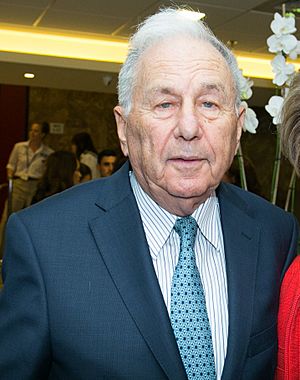Amnon Rubinstein facts for kids
Quick facts for kids
Amnon Rubinstein
|
|
|---|---|
 |
|
| Ministerial roles | |
| 1984–1987 | Minister of Communications |
| 1992 | Minister of Science & Technology |
| 1992–1993 | Minister of Energy & Infrastructure |
| 1993–1996 | Minister of Education, Culture & Sport |
| Faction represented in the Knesset | |
| 1977–1978 | Democratic Movement for Change |
| 1977–1992 | Shinui |
| 1992–2002 | Meretz |
| Personal details | |
| Born | 5 September 1931 Tel Aviv, Mandatory Palestine |
| Died | 18 January 2024 (aged 92) Tel Aviv |
Amnon Rubinstein (Hebrew: אמנון רובינשטיין) was an important figure in Israel. He was born on September 5, 1931, and passed away on January 18, 2024. He was a smart legal expert, a well-known politician, and a writer for newspapers.
Mr. Rubinstein was a member of the Knesset, which is like Israel's parliament, for many years, from 1977 to 2002. During this time, he held several important jobs as a government minister. Later in his life, he became the head of the Interdisciplinary Center (IDC) in Herzliya, a university in Israel.
Contents
Early Life and Education
Amnon Rubinstein was born in Tel Aviv when the area was known as Mandatory Palestine. His family was part of a political group called the Revisionist Zionist movement. Even though he later chose a different path, he was still influenced by the ideas of freedom and individual rights that were important to the Revisionist movement's founder, Ze'ev Jabotinsky.
After serving as a captain in the IDF, Israel's army, he went to college. He studied economics, how countries relate to each other, and law at the Hebrew University of Jerusalem. In 1963, he became a lawyer. He then earned a special advanced degree in law, called a PhD, from the London School of Economics in 1966. From 1961 to 1975, he taught law as a professor at Tel Aviv University. He was even the head of the law department there from 1968 to 1973.
Political Journey
Amnon Rubinstein started his political career after the Yom Kippur War. He created a political party called Shinui, which means "Change." Shinui later joined with another group to form a bigger party called Dash.
In the 1977 elections, Dash won many seats in the Knesset. This was a big deal because, for the first time in Israel's history, a right-wing party formed the government. However, Rubinstein didn't agree with Dash joining the government led by Menachem Begin's Likud party. So, Shinui left Dash.
Even though Shinui became a smaller party, Rubinstein kept his seat in the Knesset in the 1981 elections. In 1984, Shinui was invited to join the government, and Rubinstein became the Minister of Communications. He was re-elected in 1988, but Shinui was not part of the government that time.
Before the 1992 elections, Shinui joined with two other parties to create a new, larger party called Meretz. Meretz was a party that believed in peace and social justice. In 1992, Meretz joined the government led by Yitzhak Rabin. Rubinstein first became the Minister of Energy and Infrastructure. Soon after, he became the Minister of Education, replacing another minister.
As a lawmaker, Rubinstein helped create two important laws that protect human rights in Israel. These laws are called Basic Law: Human Dignity and Liberty and Basic Law: Freedom of Occupation.
As the Minister of Education, Rubinstein made some changes to how students entered higher education. He also changed the system for high school exams, allowing students to take fewer tests. He even spoke out against the special tests required for university applications, saying they were too hard.
After the 1996 elections, Rubinstein and Meretz left the government. He was elected one last time in 1999 and left the Knesset in October 2002.
Academic Work and Writing
After leaving politics, Rubinstein went back to working in universities. He also regularly wrote articles for Israeli newspapers, sharing his opinions.
His work as a legal expert was highly respected. His articles and books about law, especially Israeli law, were very popular. One of his collections of writings, called A Single Voice (published in 2002), showed his belief in "moderate, humanistic liberalism," which means he believed in fairness, human rights, and peaceful solutions.
Awards and Recognition
In 2006, Amnon Rubinstein received the Israel Prize for law. This is one of the highest honors in Israel. The committee that gave him the award said he was "the founding father of Israeli constitutional law." They praised him for his deep academic writings and his public work, saying he always promoted democracy, equality, and human rights. They believed few people could match his contributions to Israel as a public figure, a lawmaker, a government minister, and a brilliant legal expert.
Published Books
- Israel and the Family of Nations: The Jewish Nation State and Human Rights, 2008
- The Constitutional Law of the State of Israel
- Upholding morality
- From Herzl to Rabin: The Changing Image of Zionism
- Daat Yachid'
- Jurisdiction and Illegality: A Study in Public Law
- Absence of Government: How to Mend Israel's Broken System
- Academic Flaws – Freedom and Responsibility in Israeli Higher Education
- The Blanket
- Route no. 5
- The Sea Above Us
- The Black Sun : Kotarim International Publishing
- "The Curious Case of Jewish Democracy", Azure: Ideas for the Jewish Nation 41 (Summer 2010)
See also
- List of Israel Prize recipients
 | Delilah Pierce |
 | Gordon Parks |
 | Augusta Savage |
 | Charles Ethan Porter |

